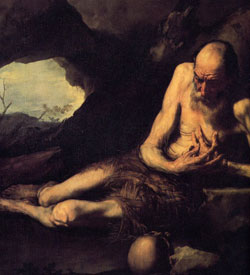Like Bartimaeus, We Are Blind: Cry out to Jesus, Lord Help Me to See!
FREE Catholic Classes
The same Jesus who passed by Bartimaeus is alive today. The Good News is that no matter what has happened in our past, Jesus walks into the dusty streets of our lives this day. We simply need the eyes of living faith to see Him and the renewed heart to follow Him on the way. Prayer is the fuel which keeps living faith alive and keeps our eyes open to see. Where is Jesus passing through in our own lives? He always shows up for those who have their spiritual eyes opened to see Him. How about in our workplace? How about in our relationships? How about in our families? Are we running out to meet Him?
Highlights
Catholic Online (https://www.catholic.org)
5/26/2016 (8 years ago)
Published in Living Faith
Keywords: Spiritual blindness, healing, Bartimaeus, Blind Bartimaeus, prayer, spiritual life, contemplation, Holy Spirit, lectio Divina, Bible Study, conversion, Deacon Keith Fournier
CHESAPEAKE, VA (Catholic Online) - In the last chapter of the Gospel of St John we read these intriguing words: 'There are also many other things that Jesus did, but if these were to be described individually, I do not think the whole world would contain the books that would be written.' (John 21:25)
They underscore the importance of the stories actually recorded in the four Gospels. The people to whom we are introduced have been selected from among many others who encountered Jesus - for a purpose. They can put us in touch with the Lord, with ourselves, with the meaning of our own lives, and with the very purpose for our existence.
Through prayerful reflection, they can become an invitation to ongoing conversion and a portal into a deeper encounter with the Risen Jesus Christ. As we enter into the stories on the pages of the sacred text, the meaning enters into us and enlightens us. Our eyes are opened and we begin to see all of life differently.
St. Jose Maria Escriva once wrote: "I advised you to read the New Testament for some minutes every day, and to enter into each scene and take part in it, as one more of the characters. This is so that you incarnate the Gospel, so that it is fulfilled in your life and make others fulfill it." (Furrow #672).
In the Gospel appointed for the Liturgy of this day we are introduced to St Mark's account of the healing of the Blind Man named Bartimaeus: "As Jesus was leaving Jericho with his disciples and a sizable crowd, Bartimaeus, a blind man, the son of Timaeus, sat by the roadside begging. On hearing that it was Jesus of Nazareth, he began to cry out and say, "Jesus, son of David, have pity on me." And many rebuked him, telling him to be silent. But he kept calling out all the more, "Son of David, have pity on me."
Jesus stopped and said, "Call him." So they called the blind man, saying to him, "Take courage; get up, Jesus is calling you." He threw aside his cloak, sprang up, and came to Jesus. Jesus said to him in reply, "What do you want me to do for you?" The blind man replied to him, "Master, I want to see." Jesus told him, 'Go your way; your faith has saved you." Immediately he received his sight and followed him on the way. (Mark 10:46-52)
In the Dogmatic Constitution on Divine Revelation offered by the Fathers of the Second Vatican Council in the Catholic Church we read some beautiful and encouraging words on how we should approach reading the Bible, "In the sacred books, the Father who is in heaven meets His children with great love and speaks with them; and the force and power in the word of God is so great that it stands as the support and energy of the Church, the strength of faith for her sons, the food of the soul, the pure and everlasting source of spiritual life." (Paragraph 21)
The insight is a key to reading the Bible fruitfully, in a way which allows us to be read by the author and changed in the encounter.. The Living Word, Jesus, speaks to us through the written word. Understanding the Bible depends upon having a living relationship with the Risen Lord Jesus, the Living Word. Everyone one of us can have that relationship through prayer.
One of my favorite definitions of a theologian is from the early Christian Monk Evagrius of Pontus, a theologian is one who "rests his head on the chest of Christ." The image calls to mind the beloved disciple, John, depicted as doing just that in early Christian art. It speaks of the indispensable prerequisite for any fruitful study of the Bible, a relationship with the Lord in the intimacy of prayer.
This way of encountering the Lord in His Word is cultivated through regular prayer. Theologians use a term, hermeneutic, which bears consideration here. A hermeneutic is a lens through which we view or interpret something of importance. It allows us to more deeply interpret and appropriate our experience. Living faith is a hermeneutic; it opens our eyes to see life differently.
Living faith enables us to see the hand of the Lord in every circumstance and to stay on the path in our daily lives. Over years of ministry I have had the privilege of praying with many people struggling on many different fronts. I find myself beginning the prayer by thanking the Lord 'for the gift of living faith which opens our eyes to see all of life differently now because of who Jesus is - and who we can become in Him.'
We all blinded by sin. The Sacrament of Baptism was called the Sacrament of the Enlightenment in the early Church for good reason. Yet, we need to keep that light of living faith alive. The beloved disciple John instructs us in his first letter:
"This is the message we have heard from him and proclaim to you, that God is light and in him is no darkness at all. If we say we have fellowship with him while we walk in darkness, we lie and do not live according to the truth; but if we walk in the light, as he is in the light, we have fellowship with one another, and the blood of Jesus his Son cleanses us from all sin." (1 John 1: 5-7)
The same Jesus who passed by Bartimaeus is alive. The Good News is that no matter what has happened in our past, Jesus walks into the dusty streets of our lives this day. We simply need the eyes of living faith to see Him and the renewed heart to follow Him on the way. Prayer is the fuel which keeps living faith alive and keeps our eyes open to see.
Where is Jesus passing through in our own lives? He always shows up for those who have their spiritual eyes opened to see Him. How about in our workplace? How about in our relationships? How about in our families? Are we running out to meet Him? St Escriva wrote in the Furrow:
"When darkness surrounds us and our soul is blind and restless, we have to go to the Light, like Bartimaeus. Repeat, shout, cry out ever more strongly, Domine, ut videam! - Lord, that I may see... And daylight will dawn upon you, and you will be able to enjoy the brightness He grants you." (Furrow #862)
Isaac of Ninevah, an eighth century monk, Bishop and theologian, wrote:"When the Spirit dwells in a person, from the moment in which that person has become prayer, he never leaves him. For the Spirit himself never ceases to pray in him. Whether the person is asleep or awake, prayer never from then on departs from his soul. Whether he is eating or drinking or sleeping or whatever else he is doing, even in deepest sleep, the fragrance of prayer rises without effort in his heart."
"Prayer never again deserts him. At every moment of his life, even when it appears to stop, it is secretly at work in him continuously, one of the Fathers, the bearers of Christ, says that prayer is the silence of the pure. For their thoughts are divine motions. The movements of the heart and the intellect that have been purified are the voices full of sweetness with which such people never cease to sing in secret to the hidden God."
Through prayer daily life can become a classroom of communion. In that classroom we learn the truth about who we are - and who we are becoming - in Jesus. Through prayer we receive new glasses through which we see the true landscape of our daily life. Through prayer darkness is dispelled and the path of progress is illuminated.
Through prayer we begin to understand why this communion seems elusive at times; as we struggle with our own disordered appetites, and live in a manner at odds with the beauty and order of the creation within which we dwell - only to find a new beginning whenever we confess our sin and return to our first love. Prayer opens us up to Revelation, expands our capacity to comprehend truth and equips us to change as we cooperate with grace.
Through prayer we are drawn into a deepening relationship with Jesus whose loving embrace on the hill of Golgotha bridged heaven with earth; His relationship with His Father is opened now to us; the same Spirit that raised Him from the dead begins to give us new life as we are converted, transfigured and made new.
Through prayer heavenly wisdom is planted in the field of our hearts and we experience a deepening communion with the Trinitarian God. We become "partakers of the divine nature." (2 Peter 1:4) Though that participation will only be fully complete when we are with Him in the fullness of His embrace, in our Resurrected Bodies and in a New Heaven and a New Earth, it begins now, in the grace of this present moment.
God holds nothing back from those whom He loves. He gives us the Holy Spirit, which is His very life and energy. He invites us to to cultivate and grow in the living faith which can transform our lives and our very characters. He enlists us in His ongoing mission. All of this progresses as we say yes and encounter Jesus Christ, in ever new and powerful ways. Living faith mediates the mystery of God's loving plan and opens our spiritual eyes to see the Lord who is walking by in our own daily lives.
Let us cry out with Bartimaeus, Lord That I May See. The same Jesus who opened His eyes will open the eyes of our hearts. -----Deacon Keith A. Fournier is Founder and Chairman of Common Good Foundation and Common Good Alliance. A member of the clergy, a Roman Catholic Deacon, he is also a constitutional/ human rights lawyer and public policy advocate who served as the first and founding Executive Director of the American Center for Law and Justice in the nineteen nineties. He has long been active at the intersection of faith, values and culture. Deacon Fournier is also a Senior Contributing Writer for THE STREAM
---'Help Give every Student and Teacher FREE resources for a world-class Moral Catholic Education'
Copyright 2021 - Distributed by Catholic Online
Join the Movement
When you sign up below, you don't just join an email list - you're joining an entire movement for Free world class Catholic education.

-

-
Mysteries of the Rosary
-
St. Faustina Kowalska
-
Litany of the Blessed Virgin Mary
-
Saint of the Day for Wednesday, Oct 4th, 2023
-
Popular Saints
-
St. Francis of Assisi
-
Bible
-
Female / Women Saints
-
7 Morning Prayers you need to get your day started with God
-
Litany of the Blessed Virgin Mary
Vatican City Leads the Way in Ethical Artificial Intelligence Regulation
-

Rising from the Ashes: Southern California's Wildfire Tragedy Sparks Resilience and Hope in the ...
-

Catholic Medical Group Challenges Biden Administration Over Emergency Room Abortion Mandate
-
FDA Proposes New Front-Facing Nutrition Labels to Promote Healthier Choices
-
Introducing 'Journey with the Messiah' - A Revolutionary Way to Experience the Bible
Daily Catholic
 Daily Readings for Wednesday, January 15, 2025
Daily Readings for Wednesday, January 15, 2025 St. Paul the Hermit: Saint of the Day for Wednesday, January 15, 2025
St. Paul the Hermit: Saint of the Day for Wednesday, January 15, 2025 Prayer for a Blessing on the New Year: Prayer of the Day for Tuesday, December 31, 2024
Prayer for a Blessing on the New Year: Prayer of the Day for Tuesday, December 31, 2024- Daily Readings for Tuesday, January 14, 2025
- St. Felix of Nola: Saint of the Day for Tuesday, January 14, 2025
- St. Theresa of the Child Jesus: Prayer of the Day for Monday, December 30, 2024
![]()
Copyright 2024 Catholic Online. All materials contained on this site, whether written, audible or visual are the exclusive property of Catholic Online and are protected under U.S. and International copyright laws, © Copyright 2024 Catholic Online. Any unauthorized use, without prior written consent of Catholic Online is strictly forbidden and prohibited.
Catholic Online is a Project of Your Catholic Voice Foundation, a Not-for-Profit Corporation. Your Catholic Voice Foundation has been granted a recognition of tax exemption under Section 501(c)(3) of the Internal Revenue Code. Federal Tax Identification Number: 81-0596847. Your gift is tax-deductible as allowed by law.










 Daily Readings for Wednesday, January 15, 2025
Daily Readings for Wednesday, January 15, 2025 St. Paul the Hermit: Saint of the Day for Wednesday, January 15, 2025
St. Paul the Hermit: Saint of the Day for Wednesday, January 15, 2025 Prayer for a Blessing on the New Year: Prayer of the Day for Tuesday, December 31, 2024
Prayer for a Blessing on the New Year: Prayer of the Day for Tuesday, December 31, 2024


